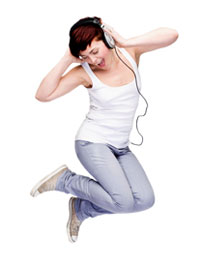 You carefully monitor your child’s whereabouts, his friends and his behavior. Do you need to monitor the music he listens to as well?
You carefully monitor your child’s whereabouts, his friends and his behavior. Do you need to monitor the music he listens to as well?
Your child hears explicit references to drug or alcohol use in one out of every three popular songs on the radio, according to a new study by the University of Pittsburgh School of Medicine. That translates to about 35 references to substance abuse per hour of music played, according to the study. That’s a lot of messages; even still, little hard data exists on the correlation between music and risky behavior in teens.
“Music impacts teen’s attitudes,” says psychologist Elizabeth P. MacKenzie. “Whether it translates to drug behaviors depends upon the balance with other things. Parents are really important for buffering against the impact of negative peer and media influence.”
Kids least at risk are those that have positive relationships with parents, school and community, MacKenzie says. “By having a positive relationship with your kids, you can provide opportunities for kids to develop skills that will help them engage in satisfying social activities where drugs are not present.
“If there is a positive relationship in place, kids are more likely to follow the expectations parents set for drug use and be concerned about consequences.”
“The messages kids get about drugs from music do not impact their decisions nearly as much as people think they do,” says child psychiatrist Elizabeth Hletko. “The biggest influence on a teen’s decisions relating to drug and alcohol use are friends and family. If you provide a good role model, set clear expectations about drugs and keep an open line of dialogue, it will go a long way to reducing your child’s risk for drugs and alcohol problems.”
Experts say parents should provide clear expectations, pay close attention to what kids are doing and establish consequences — both positive and negative — for behavior. When that family foundation isn’t secure, kids may feel lonely and isolated, and might look to fit in with an outside peer group that takes more risks. “Finding a secure social niche is critical to teens. If they don’t feel a secure connection to their parents, losing a peer is more of a threat,” says MacKenzie. Similarly, if music is of great importance to a teen’s cultural life, they might overidentify with drug-related lyrics and culture.
On the positive side, parents can use music as a point of discussion to communicate their values and expectations, says Hletko. Sally Kidder Davis, a certified parent coach, agrees. “Music has been a refuge for my children,” she says. “Teenagers are supposed to individuate at this stage in their lives. I believe it is a parent’s job to provide safe and constructive outlets for them to explore their limits, and then maybe, just maybe they may not feel the need to experiment with drugs.”
Jodi Sternoff Cohen is a Seattle-based writer and marketing consultant. She lives with her husband and two children, ages 2 and 4.
Did you know?
The University of Pittsburgh study looked at the 279 most popular songs from 2005, as ranked by Billboard magazine. References to drugs or alcohol in songs varied by genre. Only 9 percent of pop songs had lyrics relating to drugs or alcohol. The number jumped to 14 percent for rock songs, 20 percent for R&B and hip-hop songs, 36 percent for country songs and 77 percent for rap songs.









